小学英语句型转换(陈述句变一般疑问句特殊疑问句及练习)
五年级英语句型转换练习题30题含答案解析
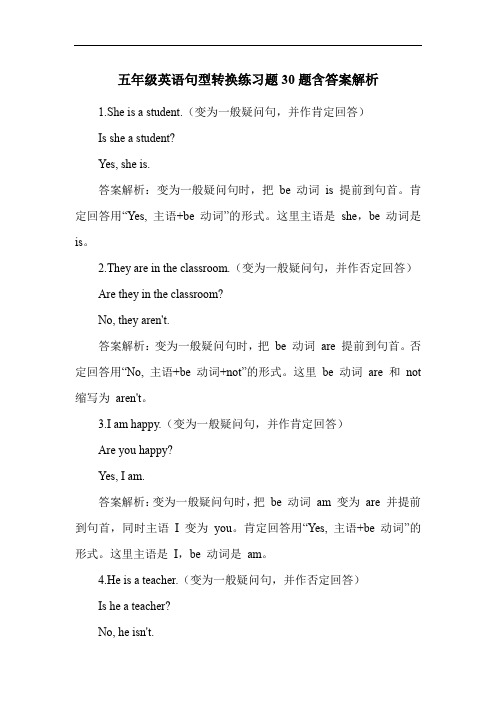
五年级英语句型转换练习题30题含答案解析1.She is a student.(变为一般疑问句,并作肯定回答)Is she a student?Yes, she is.答案解析:变为一般疑问句时,把be 动词is 提前到句首。
肯定回答用“Yes, 主语+be 动词”的形式。
这里主语是she,be 动词是is。
2.They are in the classroom.(变为一般疑问句,并作否定回答)Are they in the classroom?No, they aren't.答案解析:变为一般疑问句时,把be 动词are 提前到句首。
否定回答用“No, 主语+be 动词+not”的形式。
这里be 动词are 和not 缩写为aren't。
3.I am happy.(变为一般疑问句,并作肯定回答)Are you happy?Yes, I am.答案解析:变为一般疑问句时,把be 动词am 变为are 并提前到句首,同时主语I 变为you。
肯定回答用“Yes, 主语+be 动词”的形式。
这里主语是I,be 动词是am。
4.He is a teacher.(变为一般疑问句,并作否定回答)Is he a teacher?No, he isn't.答案解析:变为一般疑问句时,把be 动词is 提前到句首。
否定回答用“No, 主语+be 动词+not”的形式。
这里be 动词is 和not 缩写为isn't。
5.We are friends.(变为一般疑问句,并作肯定回答)Are you friends?Yes, we are.答案解析:变为一般疑问句时,把be 动词are 提前到句首,同时主语we 变为you。
肯定回答用“Yes, 主语+be 动词”的形式。
这里主语是we,be 动词是are。
6.My mother is at home.(变为一般疑问句,并作否定回答)Is your mother at home?No, she isn't.答案解析:变为一般疑问句时,把be 动词is 提前到句首,同时my 变为your。
六年级英语句式转换30道

六年级英语句式转换30道1. She is a student. (改为一般疑问句)答案:Is she a student? 解析:陈述句变一般疑问句,将be 动词is 提到句首,其余不变。
2. They are playing football. (改为一般疑问句)答案:Are they playing football? 解析:陈述句变一般疑问句,将be 动词are 提到句首,其余不变。
3. I am happy. (改为一般疑问句)答案:Are you happy? 解析:陈述句变一般疑问句,第一人称I 要变为第二人称you,be 动词am 变为are 提到句首。
4. This is a book. (改为一般疑问句)答案:Is this a book? 解析:陈述句变一般疑问句,将be 动词is 提到句首,其余不变。
5. Those are apples. (改为一般疑问句)答案:Are those apples? 解析:陈述句变一般疑问句,将be 动词are 提到句首,其余不变。
6. He likes music. (改为一般疑问句)答案:Does he like music? 解析:陈述句中没有be 动词,主语是第三人称单数he,借助助动词does 构成一般疑问句,likes 变回原形like。
7. We have lunch at school. (改为一般疑问句)答案:Do you have lunch at school? 解析:陈述句中没有be 动词,主语是we,变为一般疑问句时要变为you,借助助动词do 构成一般疑问句,have 形式不变。
8. They do their homework in the evening. (改为一般疑问句)答案:Do they do their homework in the evening? 解析:陈述句中没有be 动词,主语是they,借助助动词do 构成一般疑问句,do 的形式不变。
【史上最强】重点小学英语句型转换(陈述句变一般疑问句特殊疑问句及练习测试)
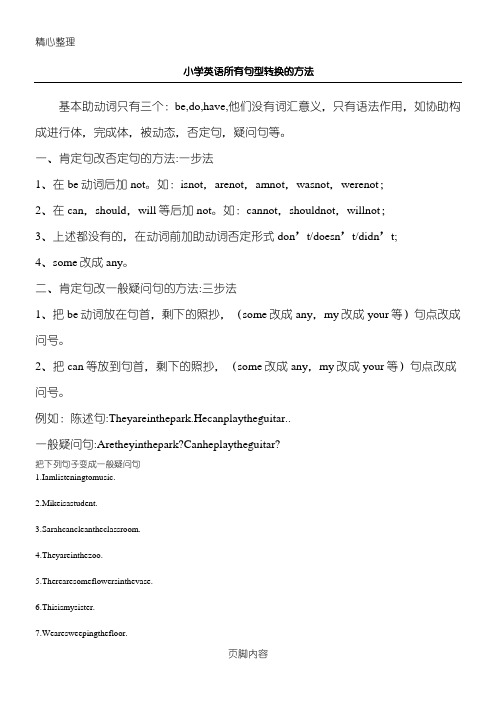
小学英语所有句型转换的方法基本助动词只有三个:be,do,have,他们没有词汇意义,只有语法作用,如协助构成进行体,完成体,被动态,否定句,疑问句等。
一、肯定句改否定句的方法:一步法1、在be动词后加not。
如:isnot,arenot,amnot,wasnot,werenot;2、在can,should,will等后加not。
如:cannot,shouldnot,willnot;3、上述都没有的,在动词前加助动词否定形式don’t/doesn’t/didn’t;4、some改成any。
二、肯定句改一般疑问句的方法:三步法1、把be动词放在句首,剩下的照抄,(some改成any,my改成your等)句点改成问号。
2、把can等放到句首,剩下的照抄,(some改成any,my改成your等)句点改成问号。
例如:陈述句:Theyareinthepark.Hecanplaytheguitar..一般疑问句:Aretheyinthepark?Canheplaytheguitar?把下列句子变成一般疑问句1.Iamlisteningtomusic._______________________________________2.Mikeisastudent._______________________________________3.Sarahcancleantheclassroom.________________________________________4.Theyareinthezoo.________________________________________5.Therearesomeflowersinthevase.________________________________________6.Thisismysister._________________________________________7.Wearesweepingthefloor.__________________________________________3、上述都没有的,在句首请助动词Do/Does/Did帮忙,剩下的照抄,(some改成any,my改成your等)句点改成问号。
小学英语句型转换(陈述句变一般疑问句特殊疑问句及练习)
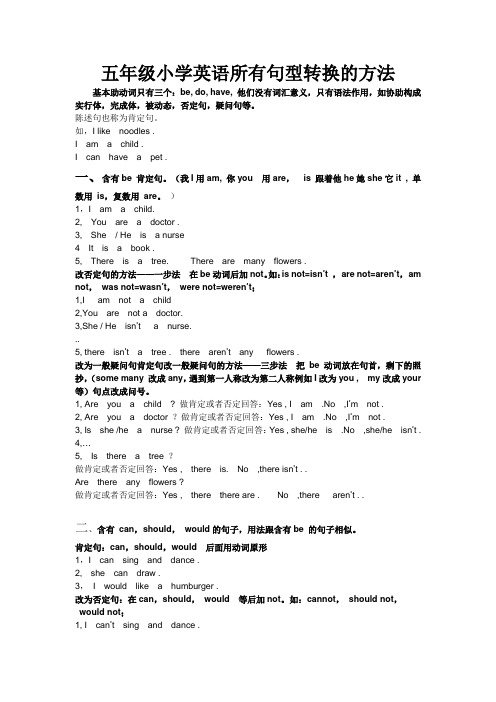
五年级小学英语所有句型转换的方法基本助动词只有三个:be, do, have, 他们没有词汇意义,只有语法作用,如协助构成实行体,完成体,被动态,否定句,疑问句等。
陈述句也称为肯定句。
如,I like noodles .I am a child .I can have a pet .一、含有be 肯定句。
(我I用am, 你you 用are,is 跟着他he她she它it , 单数用is,复数用are。
)1,I am a child.2, You are a doctor .3, She / He is a nurse4 It is a book .5, There is a tree. There are many flowers .改否定句的方法——一步法在be动词后加not。
如:is not=is n’t ,are not=aren’t,am not,was not=wasn’t,were not=weren’t;1,I am not a child2,You are not a doctor.3,She / He isn’t a nurse...5, there isn’t a tree . there aren’t any flowers .改为一般疑问句肯定句改一般疑问句的方法——三步法把be动词放在句首,剩下的照抄,(some many 改成any,遇到第一人称改为第二人称例如I改为you , my改成your 等)句点改成问号。
1, Are you a child ? 做肯定或者否定回答:Yes , I am .No ,I’m not .2, Are you a doctor ?做肯定或者否定回答:Yes , I am .No ,I’m not .3, Is she /he a nurse ? 做肯定或者否定回答:Yes , she/he is .No ,she/he isn’t . 4,…5, Is there a tree ?做肯定或者否定回答:Yes , there is. No ,there isn’t . .Are there any flowers ?做肯定或者否定回答:Yes , there there are . No ,there aren’t . .二、含有can,should,would的句子,用法跟含有be 的句子相似。
小学英语句型转换(陈述句变一般疑问句特殊疑问句及练习)

小学英语所有句型转换的方法基本助动词只有三个:be, do, have, 他们没有词汇意义,只有语法作用,如协助构成进行体,完成体,被动态,否定句,疑问句等。
一、肯定句改否定句的方法——一步法1、在be动词后加not。
如:is not , are not , am not, was not, were not;2、在can,等后加not。
如:cannot3、上述都没有的,在动词前加助动词否定形式do not, does not. (don’t/doesn’t)4、 some 改成any。
二、肯定句改一般疑问句的方法——三步法1、把be动词放在句首,剩下的照抄,(some 改成any,my改成your等)句点改成问号。
2、把can,等放到句首,剩下的照抄,(some 改成any,my改成your等)句点改成问号。
例如:陈述句: They are in the park. He can play the guitar..一般疑问句: Are they in the park? Can he play the guitar?把下列句子变成一般疑问句1. I am listening to music._______________________________________2. Mike is a student._______________________________________3. Sarah can clean the classroom.________________________________________4. They are in the zoo.________________________________________5. There are some flowers in the vase.________________________________________6.This is my sister._________________________________________7.We are sweeping the floor.__________________________________________3、上述都没有的,在句首请助动词Do/Does帮忙,剩下的照抄,(some 改成any,my改成your等)句点改成问号。
小学英语一般疑问句和特殊疑问句(附练习题)
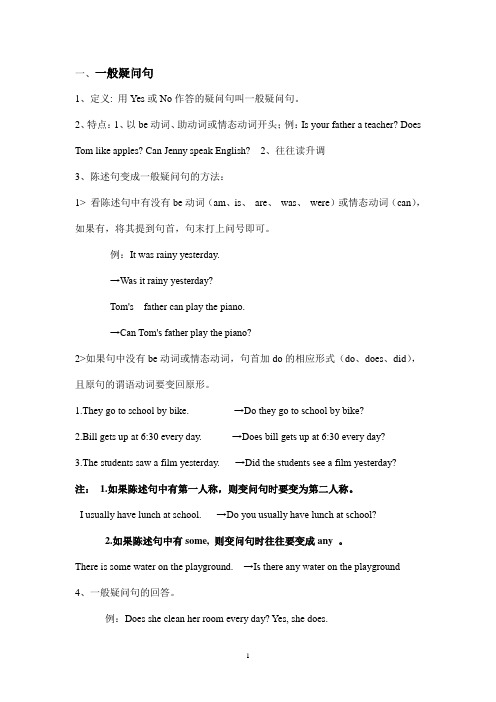
一、一般疑问句1、定义: 用Yes或No作答的疑问句叫一般疑问句。
2、特点:1、以be动词、助动词或情态动词开头;例:Is your father a teacher? Does Tom like apples? Can Jenny speak English? 2、往往读升调3、陈述句变成一般疑问句的方法:1> 看陈述句中有没有be动词(am、is、are、was、were)或情态动词(can),如果有,将其提到句首,句末打上问号即可。
例:It was rainy yesterday.→Was it rainy yesterday?Tom's father can play the piano.→Can Tom's father play the piano?2>如果句中没有be动词或情态动词,句首加do的相应形式(do、does、did),且原句的谓语动词要变回原形。
1.They go to school by bike. →Do they go to school by bike?2.Bill gets up at 6:30 every day. →Does bill gets up at 6:30 every day?3.The students saw a film yesterday. →Did the students see a film yesterday?注: 1.如果陈述句中有第一人称,则变问句时要变为第二人称。
I usually have lunch at school. →Do you usually have lunch at school?2.如果陈述句中有some, 则变问句时往往要变成any 。
There is some water on the playground. →Is there any water on the playground4、一般疑问句的回答。
句型转换(陈述句变一般疑问句特殊疑问句及练习测试)
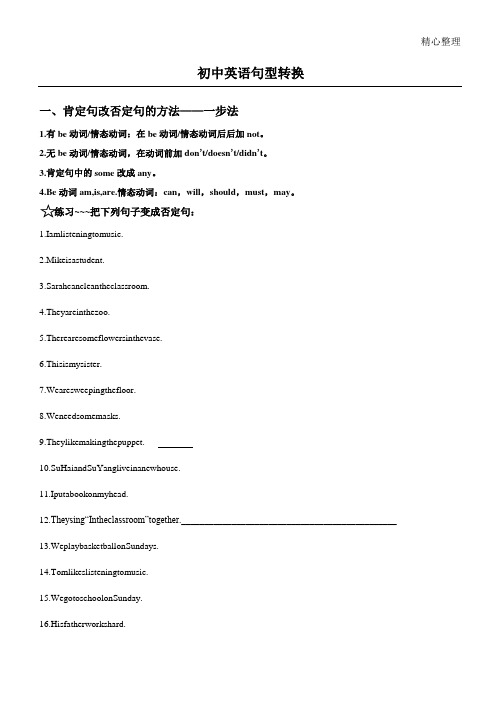
精心整理初中英语句型转换一、肯定句改否定句的方法——一步法1.有be动词/情态动词:在be动词/情态动词后后加not。
2.无be动词/情态动词,在动词前加don’t/doesn’t/didn’t。
3.肯定句中的some改成any。
4.Be动词am,is,are.情态动词:can,will,should,must,may。
练习~~~把下列句子变成否定句:1.Iamlisteningtomusic. _______________________________________2.Mikeisastudent. _______________________________________3.Sarahcancleantheclassroom. _______________________________________4.Theyareinthezoo. _______________________________________5.Therearesomeflowersinthevase._______________________________________6.Thisismysister. _______________________________________7.Wearesweepingthefloor.___________________________8.Weneedsomemasks. _________________________________9.Theylikemakingthepuppet. _________________________________10.SuHaiandSuYangliveinanewhouse.______________________________________________11.Iputabookonmyhead. _________________________________________________12.Theysing“Intheclassroom”together._______________________________________________13.WeplaybasketballonSundays. _________________________________________________14.Tomlikeslisteningtomusic. ____________________________________________15.WegotoschoolonSunday._________________________________________________16.Hisfatherworkshard._________________________________________________17.AlicewillgototheSummerPalace.____________________________________________18.Youshouldstudyhardforyourself.__________________________________________二、肯定句改一般疑问句的方法——三步法1.有be动词/情态动词:be动词/情态动词提到句首,其余照抄,(some改any,my改your)句末用问号。
(完整版)句型转换(陈述句变一般疑问句特殊疑问句及练习)
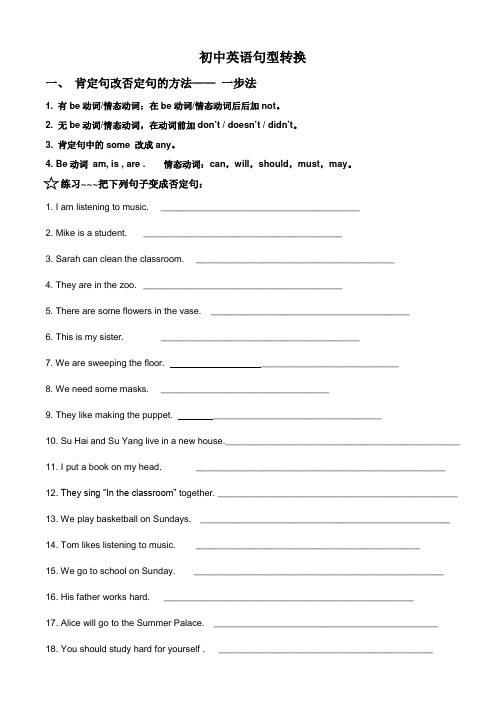
初中英语句型转换一、肯定句改否定句的方法——一步法1. 有be动词/情态动词:在be动词/情态动词后后加not。
2. 无be动词/情态动词,在动词前加don’t / doesn’t / didn’t。
3. 肯定句中的some 改成any。
4. Be动词am, is , are . 情态动词:can,will,should,must,may。
练习~~~把下列句子变成否定句:1. I am listening to music. _______________________________________2. Mike is a student. _______________________________________3. Sarah can clean the classroom. _______________________________________4. They are in the zoo. _______________________________________5. There are some flowers in the vase. _______________________________________6. This is my sister. _______________________________________7. We are sweeping the floor. ___________________________8. We need some masks. _________________________________9. They like making the puppet. _________________________________10. Su Hai and Su Yang live in a new house.______________________________________________11. I put a book on my head. _________________________________________________12. They sing “In the classroom” together. _______________________________________________13. We play basketball on Sundays. _________________________________________________14. Tom likes listening to music. ____________________________________________15. We go to school on Sunday. _________________________________________________16. His father works hard. _________________________________________________17. Alice will go to the Summer Palace. ____________________________________________18. You should study hard for yourself . __________________________________________1. 有be动词/情态动词:be动词/情态动词提到句首,其余照抄,(some改any,my改your)句末用问号。
句型转换(陈述句变一般疑问句特殊疑问句及练习)

初中英语句型转换一、肯定句改否定句地方法——一步法. 有动词情态动词:在动词情态动词后后加.. 无动词情态动词,在动词前加’’’.. 肯定句中地改成.. 动词, , . 情态动词:,,,,.练习把下列句子变成否定句:......... “ ”. .. .. .. .. .二、肯定句改一般疑问句地方法——三步法. 有动词情态动词:动词情态动词提到句首,其余照抄,(改,改)句末用问号. . 无动词情态动词,在句首加,其余照抄,(改,改)句末用问号.. 加、地句子注意,句子动词要变成原型.例如:陈述句: . ..一般疑问句: ? ?陈述句: . .一般疑问句:? ?把下列句子变成一般疑问句......... “ ”. .三、肯定句改特殊疑问句地方法——四步法关于特殊疑问词问人(谁)地点(何地)时间(何时) 、 东西职业事物(什么) 方式方法程序身体(怎样) 原因 哪一个年龄 ..怎么样(提建议)多少钱谁地 (, …) 问星期 问日期问数量多少 (可数名词) (…) 问数量(不可数名词) (…) 颜色 班级 年级、在一般疑问句地基础上,句首添加一个疑问词即可,可根据划线部分确定是什么疑问词. 、接着找动词或,, 等放在疑问词后面,若没有则请助动词帮忙,写在疑问词后面, 除外,必须先写物品,再写动词等.b5E2R 。
、划线部分去掉后剩下地内容照抄,( 改成,改成等) 、句点改成问号.练一练、: ? ’ . 、: ? ’ . 、: ? ’ . 、: ? : ’ . 、: ? . 、: ? ’ . 、: ? ’ . 、: ? : . 、: ? ’ . ? : ’ . 、 ? : ’.综合练习:1. .否定句: 一般疑问句: 对划线部分提问:个人收集整理-ZQ 2. .(音乐会)否定句:一般疑问句:对划线部分提问:. .否定句:一般疑问句:肯定否定回答:. .否定句:一般疑问句:对划线部分提问:. .否定句:一般疑问句:肯定否定回答:对划线部分提问:. .否定句:一般疑问句:肯定否定回答:对划线部分提问:. .否定句:一般疑问句:肯定否定回答:对划线部分提问:. .否定句:一般疑问句:肯定否定回答:对划线部分提问:。
句型转换(陈述句变一般疑问句特殊疑问句及练习)
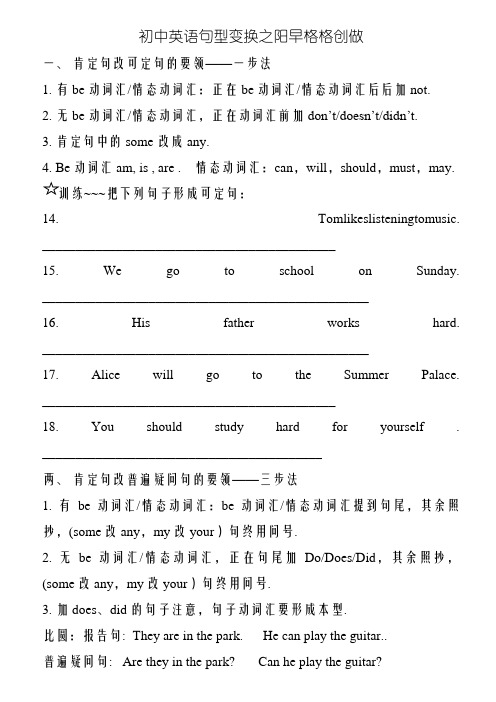
初中英语句型变换之阳早格格创做一、肯定句改可定句的要领——一步法1. 有be动词汇/情态动词汇:正在be动词汇/情态动词汇后后加not.2. 无be动词汇/情态动词汇,正在动词汇前加don’t/doesn’t/didn’t.3. 肯定句中的some 改成any.4. Be动词汇 am, is , are . 情态动词汇:can,will,should,must,may.~~~把下列句子形成可定句:14. Tomlikeslisteningtomusic. ____________________________________________15. We go to school on Sunday. _________________________________________________16. His father works hard. _________________________________________________17. Alice will go to the Summer Palace. ____________________________________________18. You should study hard for yourself . __________________________________________两、肯定句改普遍疑问句的要领——三步法1. 有be动词汇/情态动词汇:be动词汇/情态动词汇提到句尾,其余照抄,(some改any,my改your)句终用问号.2. 无be动词汇/情态动词汇,正在句尾加Do/Does/Did,其余照抄,(some改any,my改your)句终用问号.3. 加does、did 的句子注意,句子动词汇要形成本型.比圆:报告句: They are in the park. He can play the guitar..普遍疑问句: Are they in the park? Can he play the guitar?报告句: I like the ducks. He likes the dogs.普遍疑问句:Do you like the ducks? Does he like the dogs?14. Tom likes listening to music._______________________________________三、肯定句改特殊疑问句的要领——四步法闭于特殊疑问词汇问人(谁) who天面(何天)where时间(何时)when、what time东西/工做/实物(什么) what办法要领步调身体(何如)how本果 why哪一个which年龄 how old..怎么样(提修议)How about几钱 How much谁的whose (book, pen…)问星期what day问日期what date问数量几(可数名词汇) How many(people…)问数量(不可数名词汇)How much (water…)颜色 what color班级 what class年级 what grade1、正在普遍疑问句的前提上,句尾增加一个疑问词汇即可,可根据划线部分决定是什么疑问词汇.2、交着找be动词汇或者can,shall, will等搁正在疑问词汇后里,若不则请帮动词汇do/does/did帮手,写正在疑问词汇后里,how many除中,必须先写东西,再写be动词汇等.3、划线部分来掉后剩下的实质照抄,(some 改成any,my改成your等)4、句面改成问号.1、A: _______ is the boy in blue? B:He’s Mike.2、A: _______pen is it? B:It’s mine.3、A: _______ is the diary? B:It’s under the chair.4、A: _______ is the Christmas Day? B: It’s on the 25th of December.5、A: _______ are the earphones? B:They are 25 Yuan.6、A: _______ is the cup? B:It’s blue.7、A: _______ is it today? B:It’s Sunday.8、A: _______ was it yesterday? B: It was the 13th of October.9、A: _______ this red one? B:It’s beautiful.10.A:_______ is your cousin? B: He’s 15 years old.11、A:_______ do you have dinner? B: At 6 o’clock.1.The children have a good time in the park.可定句:_______________________________________ ___普遍疑问句:_______________________________________ _对于划线部分提问:____________________________________2. There are about nine hundred people at the concert.(音乐会)可定句:_______________________________________ ___普遍疑问句:_______________________________________ _对于划线部分提问:____________________________________3. There is only one problem.可定句:______________________________________ ____普遍疑问句:______________________________________ __肯定/可定回问:____________________________________4. Ann does her homeworkevery evening.可定句:______________________________________ ____普遍疑问句:______________________________________ __对于划线部分提问:____________________________________5. I read an English book every day.可定句:______________________________________ ____普遍疑问句:________________________________________肯定/可定回问:____________________________________ 对于划线部分提问:____________________________________6. My brother isin the park now.可定句:______________________________________ ____普遍疑问句:______________________________________ __肯定/可定回问:____________________________________ 对于划线部分提问:____________________________________7. She has some bread for lunch today.可定句:______________________________________ ____普遍疑问句:______________________________________ __肯定/可定回问:____________________________________ 对于划线部分提问:____________________________________8. They read Englishevery day.可定句:______________________________________ ____普遍疑问句:______________________________________ __肯定/可定回问:____________________________________ 对于划线部分提问:____________________________________。
五年级英语句型转换练习题30题带答案解析
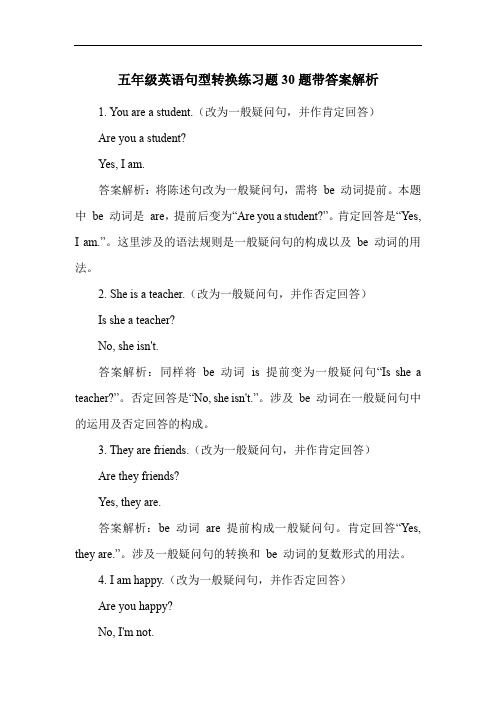
五年级英语句型转换练习题30题带答案解析1. You are a student.(改为一般疑问句,并作肯定回答)Are you a student?Yes, I am.答案解析:将陈述句改为一般疑问句,需将be 动词提前。
本题中be 动词是are,提前后变为“Are you a student?”。
肯定回答是“Yes, I am.”。
这里涉及的语法规则是一般疑问句的构成以及be 动词的用法。
2. She is a teacher.(改为一般疑问句,并作否定回答)Is she a teacher?No, she isn't.答案解析:同样将be 动词is 提前变为一般疑问句“Is she a teacher?”。
否定回答是“No, she isn't.”。
涉及be 动词在一般疑问句中的运用及否定回答的构成。
3. They are friends.(改为一般疑问句,并作肯定回答)Are they friends?Yes, they are.答案解析:be 动词are 提前构成一般疑问句。
肯定回答“Yes, they are.”。
涉及一般疑问句的转换和be 动词的复数形式的用法。
4. I am happy.(改为一般疑问句,并作否定回答)Are you happy?No, I'm not.答案解析:be 动词am 在变为一般疑问句时,要变为are,且主语变为you。
否定回答是“No, I'm not.”。
涉及be 动词的变化及否定回答的构成。
5. He is tall.(改为一般疑问句,并作肯定回答)Is he tall?Yes, he is.答案解析:将be 动词is 提前变为一般疑问句。
肯定回答“Yes, he is.”。
涉及一般疑问句的构成及be 动词的用法。
6. We are in the classroom.(改为一般疑问句,并作否定回答)Are you in the classroom?No, we aren't.答案解析:be 动词are 提前构成一般疑问句。
小学英语句型转换(陈述句变一般疑问句特殊疑问句及练习)92290
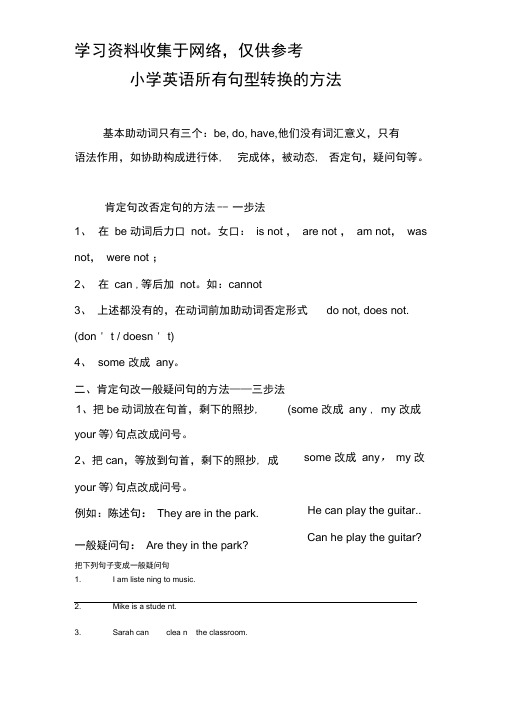
学习资料收集于网络,仅供参考小学英语所有句型转换的方法基本助动词只有三个:be, do, have,他们没有词汇意义,只有肯定句改否定句的方法 -- 一步法1、 在 be 动词后力口 not 。
女口: is not , are not , am not , was not , were not ;2、 在 can ,等后加 not 。
如:cannot3、 上述都没有的,在动词前加助动词否定形式 do not, does not.(don ' t / doesn ' t) 4、 some 改成 any 。
二、肯定句改一般疑问句的方法——三步法your 等)句点改成问号。
2、把can ,等放到句首,剩下的照抄, 成your 等)句点改成问号。
例如:陈述句: They are in the park. 一般疑问句: Are they in the park?把下列句子变成一般疑问句 1. I am liste ning to music. 2. Mike is a stude nt. 3.Sarah canclea n the classroom.语法作用,如协助构成进行体, 完成体,被动态, 否定句,疑问句等。
1、把be 动词放在句首,剩下的照抄, (some 改成 any , my 改成some 改成 any , my 改He can play the guitar.. Can he play the guitar?学习资料3、上述都没有的,在句首请助动词Do/Does帮忙,剩下的照抄, (some 改成any,my 改成your等)句点改成问号。
例如:陈述句:I like the ducks. He likes the dogs.一般疑问句:Do you like the ducks? Does he like the dogs? 把下列句子改为一般疑问句。
1. We n eed some masks.2. They like making the puppet.3. Su Hai and Su Yang live in a new house.4.I put a book on my head.5. They sing "In the classroom ” together.6. We play basketball on Sun days.7. Tom likes liste ning to music三、肯定句改特殊疑问句的方法----- 四步法1、在一般疑问句的基础上,句首添加一个疑问词即可,可根据划线部分确定是什么疑问词。
小学英语句型转换练习题

小学英语句型转换练习题一、陈述句与特殊疑问句转换1. She is playing the piano.→ What is she doing?2. They are eating ice cream.→ What are they doing?3. He likes basketball.→ What does he like?4. We have a test tomorrow.→ When do we have a test?5. Amy has a cute dog.→ What does Amy have?二、一般疑问句与特殊疑问句转换1. You can swim, can't you?→ Can you swim?2. They have finished their homework, haven't they?→ Have they finished their homework?3. She is going to the party, isn't she?→ Is she going to the party?4. He was reading a book, wasn't he?→ Was he reading a book?5. We have seen the movie, haven't we?→ Have we seen the movie?三、肯定句与否定句转换1. She likes apples.→ She doesn't like apples.2. They can skate.→ They can't skate.3. He will go to school tomorrow.→ He won't go to school tomorrow.4. We had lunch at the restaurant.→ We didn't have lunch at the restaurant.5. I am doing my homework.→ I am not doing my homework.四、选择疑问句与特殊疑问句转换1. Is he going to the park or the zoo?→ Where is he going?2. Does she want an apple or an orange?→ What does she want?3. Did they watch a movie or play games?→ What did they do?4. Are you going to the party or staying at home?→ What are you doing?5. Will they have pizza or pasta for dinner?→ What will they have for dinner?五、改写句子类型1. He is running fast. (改为感叹句)→ How fast he is running!2. They are playing soccer. (改为一般疑问句)→ Are they playing soccer?3. She plays the guitar every day. (改为否定句)→ She doesn't play the guitar every day.4. We went to the beach last summer. (改为特殊疑问句)→ When did we go to the beach?5. I will help you with your homework. (改为选择疑问句)→ Will I help you with your homework or not?六、完成对话A: Hello, can I help you?B: Yes, I'm looking for a book about science.A: (1) ________________?B: I need it for my science project.A: (2) ________________?B: Sure, I have a library card.A: Great. (3) ________________?B: Hmm, I'm not sure. Can you recommend a popular one?A: (4) ________________. It's very informative and easy to understand. B: That sounds perfect. Thank you!A: (5) ________________.B: Bye!(1) What are you looking for?(2) Do you have a library card?(3) Do you know any specific book?(4) I recommend "Science Explained".(5) You're welcome.。
小学三年级英语句式转换20道
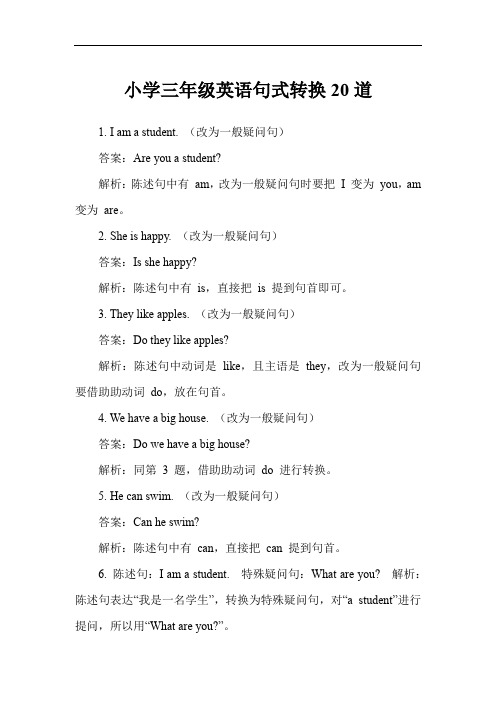
小学三年级英语句式转换20道1. I am a student. (改为一般疑问句)答案:Are you a student?解析:陈述句中有am,改为一般疑问句时要把I 变为you,am 变为are。
2. She is happy. (改为一般疑问句)答案:Is she happy?解析:陈述句中有is,直接把is 提到句首即可。
3. They like apples. (改为一般疑问句)答案:Do they like apples?解析:陈述句中动词是like,且主语是they,改为一般疑问句要借助助动词do,放在句首。
4. We have a big house. (改为一般疑问句)答案:Do we have a big house?解析:同第3 题,借助助动词do 进行转换。
5. He can swim. (改为一般疑问句)答案:Can he swim?解析:陈述句中有can,直接把can 提到句首。
6. 陈述句:I am a student. 特殊疑问句:What are you? 解析:陈述句表达“我是一名学生”,转换为特殊疑问句,对“a student”进行提问,所以用“What are you?”。
7. 陈述句:She likes apples. 特殊疑问句:What does she like? 解析:原句说“她喜欢苹果”,对“apples”提问,要用“What does she like?”,注意助动词用does。
8. 陈述句:They are in the classroom. 特殊疑问句:Where are they? 解析:原句表示“他们在教室里”,对“in the classroom”提问,问地点用“Where are they?”。
9. 陈述句:He has a pen. 特殊疑问句:What does he have? 解析:“他有一支笔”,对“a pen”提问,借助助动词does ,所以是“What does he have?”。
小学英语一般疑问句和特殊疑问句(附练习题)

小学英语一般疑问句和特殊疑问句(附练习题)一、一般疑问句一般疑问句是需要用Yes或No作答的疑问句。
它的特点是以be动词、助动词或情态动词开头,并且往往读升调。
要将陈述句变成一般疑问句,有两种方法。
如果陈述句中有be动词或情态动词,就将它们提到句首,句末加上问号即可。
如果句中没有这些动词,就在句首加上do的相应形式,并将原句的谓语动词变回原形。
需要注意的是,如果陈述句中有第一人称,变成疑问句时要变为第二人称。
而如果陈述句中有some,变成疑问句时往往要变成any。
回答一般疑问句时,如果问句主语是this或that,就用it代替;如果问句主语是these或those,就用they代替。
例如,如果问句是“Does she clean her room every day?”,回答可以是“Yes。
she does.”如果问句是“Is this your book?”,回答可以是“Yes。
it is.”1._______ is your favorite color?2._______ did you go on n?3._______ is your birthday?4._______ is your best friend?答案:1.What2.Where3.When4.Who二、改写句子1.His XXX.What was his father's job?2.XXX.Why are these cats crying?3.They can swim.What can they do?4.I went to school on foot.How did you go to school?5.His father goes to work by bus.How does his father go to work?6.Mrs。
Li and Kitty XXX.What can Mrs。
Li and Kitty do?7.Kitty is XXX.What is Kitty wearing?8.The two boys under the tree were hungry. Who was hungry under the tree?9.Mrs。
句型转换陈述句变一般疑问句特殊疑问句及练习

初中英语句型变换一、必定句改否定句的方法——一步法1.有 be 动词 / 神情动词:在 be 动词 / 神情动词后后加 not 。
2.无 be 动词 / 神情动词,在动词前加 don’t/doesn ’ t/didn ’ t 。
3.必定句中的 some改成 any。
4.Be 动词 am,is,are.神情动词:can,will,should,must,may。
练习 ~~~把以下句子变成否定句:1.Iamlisteningtomusic._______________________________________2.Mikeisastudent. _______________________________________3.Sarahcancleantheclassroom._______________________________________4.Theyareinthezoo._______________________________________6.Thisismysister._______________________________________9.Theylikemakingthepuppet._________________________________11.Iputabookonmyhead._________________________________________________12.Theysing “Intheclassroom ”13.WeplaybasketballonSundays._________________________________________________14.Tomlikeslisteningtomusic.____________________________________________二、必定句改一般疑问句的方法——三步法1. 有 be 动词 / 神情动词: be 动词 / 神情动词提到句首,其余照抄,(some 改 any,my改 your )句末用问号。
- 1、下载文档前请自行甄别文档内容的完整性,平台不提供额外的编辑、内容补充、找答案等附加服务。
- 2、"仅部分预览"的文档,不可在线预览部分如存在完整性等问题,可反馈申请退款(可完整预览的文档不适用该条件!)。
- 3、如文档侵犯您的权益,请联系客服反馈,我们会尽快为您处理(人工客服工作时间:9:00-18:30)。
小学英语问句总复习★必备知识点:1.be动词:am、is、are、was、were;小学阶段,be动词后只接名词,形容词或动词的ing形式。
2.助动词:do、does、did、have、had;助动词后的动词用原形。
3.情态动词can、must、will、may、need等;情态动词+动词原形一、肯定句、否定句定义1.肯定句:表示肯定的意思, 即不含有否定词“不”。
例:我是一个学生I am a student. 他去上学He goes to school.2.否定句:表示否定的意思。
例:我不是一个男孩。
I am not a boy 他不去上学He does not go to school. 二、一般疑问句(一)、什么是一般疑问句用Yes或No作答的疑问句叫一般疑问句。
一般疑问句还有下列特点:1、以be动词、助动词或情态动词开头;例:Is your father a teacher? Does Catherine like animals?Can Jenny speak French?2、往往读升调;3、译成汉语,都可以带上“吗”,例如上面三句可分别译为:你父亲是老师吗?凯瑟琳喜欢动物吗?詹妮会说法语吗?★(二)、如何将陈述句变成一般疑问句?要将陈述句变成一般疑问句,可以遵循下列步骤:1.看句中有没有be动词(am、is、are、was、were)、助动词(do、does、did、have、had)或情态动词(can、must、will、may等),如果有,将其提到句首,句末打上问号即可。
例:It was rainy yesterday. →Was it rainy yesterday?Tom's father can play the piano. →Can Tom's father play the piano?I have finished my homework.→Have you finished your homework?2.如果句中没有be动词、助动词或情态动词,则根据谓语动词的形式借助do的相应形式放在句首。
具体方法是:如果谓语动词是原形,则借do;如果谓语动词是一般现在时第三人称单数形式,则借does;如果谓语动词是过去式,则借did.需要注意的是,借does或did后,原句的谓语动词要变回原形。
例:They go to school by bike. →Do they go to school by bike?Bill gets up at 6:30 every day.→Does bill get up at 6:30 every day?The students saw a film yesterday. →Did the students see a film yesterday? ★(三).陈述句变一般疑问句应注意的事项陈述句变成一般疑问句除了遵循上述规则以外,还应注意下列几点:1.如果陈述句中有第一人称,则变问句时最好要变为第二人称。
例:I usually have lunch at school.→Do you usually have lunch at school?My father is playing soccer.→Is your father playing soccer?2.如果陈述句中有some, 则变问句时往往要变成any 。
例:There is some water on the playground.→Is there any water on the playground?3.复合句变一般疑问句通常只变主句,从句不变。
例:I know he comes from Canada.→Do you know he comes from Canada?4.如果句中含有实义动词have且表示“有”时,除借do外,也可将其直接提到句首。
例:I have some friends in America.→Have you any friends in America?/Do you have any friends in America?(四).一般疑问句的回答一般疑问句往往采用简短回答,共由三部分(三个单词)组成,对这三部分(三个单词)的确定可以概括例下:1.第一个词:不是Yes就是No。
(注意:有时根据语气的不同,Yes可由Sure, Certainly,Of course等代替.No可由sorry 代替.)2.第二个词:问谁答谁。
即答语中的主语须与问句的主语一致(但必须用主格代词)。
例:Does she clean her room every day? Yes, she does.Is Anna′s father a doctor? No,he isn′t.如果主语是this that,回答时用it 代替,如果问句中主语是these, those回答时用they代替。
3.第三个词:用什么问,用什么答。
即沿用问句中的引导词。
例:Can Jim play soccer? Yes, he can.Does Mr Bean speak English? Yes, he does.需要注意问题:用may 引导的问句,肯定回答用may,否定回答用can′t 或mustn′t,用must 引导的问句,肯定回答用must,否定回答用needn′t.例:May I go to the park now? Yes, you may. /No, you mustn′t.Must I wash my clothes now? Yes, you must. /No, you needn′t. 4.用No开头作否定回答时,结尾要加上not。
因为回答必须是三部分,所以否定回答必须缩写,而肯定回答不能缩写。
例:Did Thomas come here yesterday? Yes, he did./ No ,he didn′t.。
三、特殊疑问句(一)什么是特殊疑问句:以疑问词开头,对句中某一成分提问的句子叫特殊疑问句。
★(二)常用的疑问词有:★(三)小学阶段,特殊疑问句句型结构有:1、特殊疑问词+助动词+主语+动词原形+其他? eg:Where do you do study English?2、特殊疑问词+be 动词+主语+其他? eg:Why is your Mum so angry?3、特殊疑问词+情态动词+主语+动词原形+其他? eg:What can I do for you?★(四)肯定句、否定句、一般疑问句和特殊疑问句的相互转换1、肯定句变否定句:在am, is, are 后面加上not,其余按顺序照抄。
2、肯定句变一般疑问句:把am, is, are 提前放到句首并大写Am, Is, Are,其余照抄。
3、肯定句变特殊疑问句(就划线部分提问):分3步骤 第一步:先变一般疑问句第二步:找合适的特殊疑问词代替划线部分第三步:特殊疑问词提前放到句首,并大写,其余按顺序照抄,省略划线部分。
例如:1. 肯定句、否定句和一般疑问句的互换 肯定句:This is a book. 否定句:一般疑问句:Is this a book?肯定回答:Yes, it is. 否定回答:No, it isn ’t.2. 就划线部分提问(变特殊疑问句) This is a book.第一步:变一般疑问句Is this a book?第二步:找合适的特殊疑问词Is this what ?第三步:特殊疑问词提前放到句首,并大写,其余按顺序照抄,省略划线部分。
What is this?1do not或者does not,其余按顺序照抄动词用原形2、肯定句变一般疑问句:在句首加do或者does并大写,其余照抄。
注意:动词用原形3、肯定句变特殊疑问句(就划线部分提问):分3步骤第一步:先变一般疑问句第二步:找合适的特殊疑问词代替划线部分第三步:特殊疑问词提前放到句首,并大写,其余按顺序照抄,省略划线部分。
4.划线部分不能在特殊疑问句中出现。
非三单时用do,三单时用does例:非三单肯定句:I like English. 三单肯定句:He likes English.否定句:否定句:就划线部分提问:I like English.第一步:先变一般疑问句Do you like English? 第二步:找合适的特殊疑问词代替划线部分Do you like what?第三步:特殊疑问词提前放到句首,并大写,其余按顺序照抄,省略划线部分。
What do you like?★特殊:1.some变为any。
如:There are some birds in the tree.→There aren't any birds in the tree.但是,若在表示请邀请、请求的句子中,some可以不变。
如:Wouldyou like some orange juice?与此相关的一些不定代词如something, somebody等也要进行相应变化。
2.and变为or。
如:I have a knife and a ruler.→I don't have a knife or a ruler.3.a lot of (=lots of)变为many或much。
如:They have a lot of friends.(可数名词)→They don't have many friends.There is lots of orange in the bottle.(不可数名词)→There isn't much orange in the bottle.小学英语问句练习一、在横线上填上适当的疑问代词1、A: is the boy in blue?B:He’s Mike.2、A: pen is it?B:It’s mine.3、A: is the diary?B:It’s under the chair.4、A: is the Chirstmas Day?B: It’s on the 25th of December.5、A: are the earphones?B:They are 25 yuan.6、A: is the cup?B:It’s blue.7、A: is it today?B:It’s Sunday.8、A: was it yesterday?B: It was the 13th of October.9、A: this red one?B:It’s beautiful.10、A:is your cousin?B: He’s 15 years old.11、A:do you have dinner?B: At 6 o’clock.二、把下列句子改为一般疑问句。
